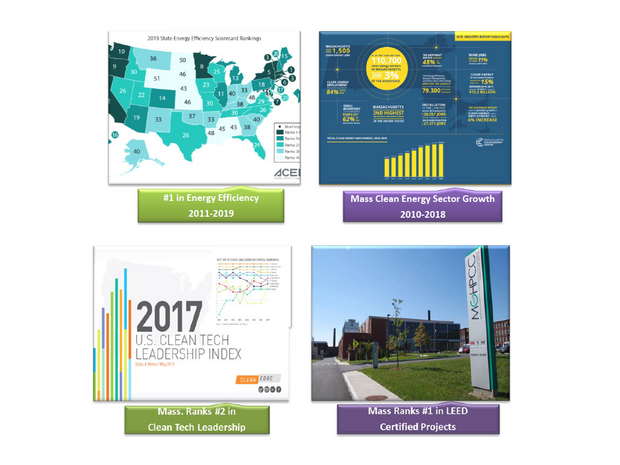Rankings/Progress
Massachusetts continues to lead the way nationally in ensuring clean, reliable and efficient energy, ranking in the top 10 nationally in numerous energy categories. In 2020, the Commonwealth ranked 2nd in the ACEEE 2020 Energy Efficiency Rankings and ranked 1st nationally for LEED Green Building (2020) per capita (U.S. Green Building Council). Massachusetts also ranked 8th in new installed solar capacity in 2021 (SEIA).
As a result of all this activity, the clean energy sector continues to grow. The Massachusetts Clean Energy Center (MassCEC) released its 2022 Clean Energy Industry Report showing that there are more than 104,000 clean energy workers in Massachusetts, 3% of the workforce. Since 2021, Massachusetts added 3,082 clean energy jobs, and the industry contributes over $28 billion to the Massachusetts Gross State Product. Clean energy employment has grown 73% since 2010. For more information see the MassCEC's 10-Year impact report tracking the growth of the clean energy sector.
Massachusetts also continues to pursue innovative measures to ensure grid modernization and storage as well as alternative transportation. In 2017, the Administration announced a 200 MWH target for energy storage by 2020 as part of its broader Energy Storage Initiative. In 2020, DOER announced the first in the nation Clean Peak Energy Standard designed to provide incentives to clean energy technologies that can supply electricity or reduce demand during seasonal peak demand periods.
On the Alternative Transportation front, Massachusetts ranked 7th in terms of Electric Vehicle (EV)sales by state in 2017, selling 4,632 electric vehicles. The number of EVs sold in Massachusetts increased by 59.4% between 2016 and 2017. Massachusetts also ranked 9th in terms of electric vehicle market share within states. Battery Electric Vehicles (BEV) sales increased by more than 70.5 percent between 2016 and 2017. This brings Massachusetts closer to its goal of having 300,000 ZEVs on the road by 2025 as part of its participation in the Multi-State Zero Emission (ZEV) Memorandum of Understanding signed in 2013.
Additional Resources
Contact
Online
Phone
Open M-F 8:45am-5:00pm
